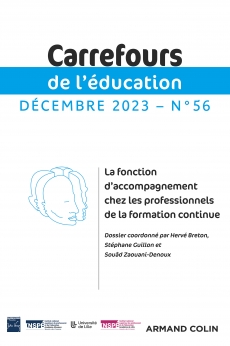
CARREFOURS DE L'ÉDUCATION N°56 (2/2023)
Pour acheter ce numéro, contactez-nous
Recevez les numéros de l'année en cours et accédez à l'intégralité des articles en ligne.
Notre article vise à interroger la nature, les modalités et les acteurs d’un accompagnement spécifique : celui d’adultes en reconversion à des métiers manuels se formant par l’alternance. Les spécificités de ces parcours supposent le recours à des formes multiples d’accompagnement, issues des sphères institutionnelle, formative ou familiale. Dans quelle mesure l’accompagnement de ces trajectoires constitue-t-il un levier de réalisation ? Des entretiens menés auprès de dix candidats témoignent de l’accompagnement reçu et de leurs attentes, parfois déçues. À la faveur de ressources individuelles, puisées dans l’expérience professionnelle et nourries des freins rencontrés, ces adultes, en constante transaction, négocient leurs transitions par leurs propres moyens. L’accompagnement de ces trajectoires nécessiterait, en revanche, la création d’un espace d’écoute, de dialogue voire de controverse, reconnaissant la légitimité du projet et permettant au sujet de l’incarner.
This paper purports to question the nature, the modalities and the agents of a specific form of guidance: the accompaniment of adults retraining for manual professions through work place and school training. The specificities of such career choices suppose the use of multiple forms of accompaniment, coming from the institutional, training and familial spheres. To what degree does accompanying these trajectories constitute a factor in their success? Interviews with ten candidates testify to the accompaniment they got and to their expectations, at times unmet. These adults, constantly involved in transactions, negotiate their transitions through their on means, thanks to individual resources, obtained in professional experience and enriched through the obstacles overcome. Accompanying these trajectories should require nonetheless the creation of a space for listening, dialogue, even debate, which would recognise the legitimacy of the project and allow the subject to represent it physically.